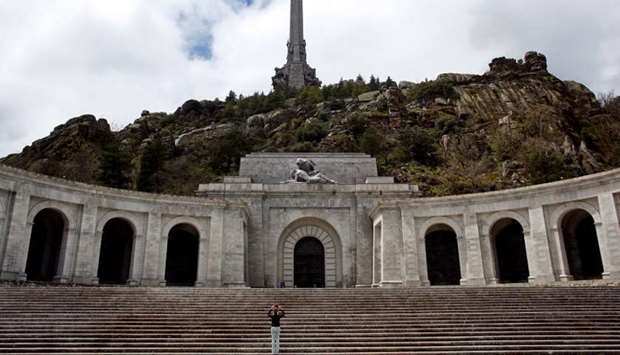Work started on Monday to exhume bodies of Spanish Civil War victims from a huge monument outside Madrid, built under the auspices of dictator Francisco Franco, following a six-year legal battle by relatives to give the men a dignified burial.
The moves to extract the remains of four men who died on both sides of the 1936-39 civil war, at the request of relatives, could lead to more demands for exhumations at the giant mausoleum the Valle de los Caidos (Valley of the Fallen).
‘At the end of the day, they are our grandfathers, and we want to take them home,’ said Rosa Gil, granddaughter of Pedro Gil who died fighting on the side of Franco's victorious Nationalist forces.
The civil war still casts a shadow over the country nearly eight decades after its end.
An amnesty law drawn up to smooth the path from dictatorship in the late 1970s pardoned political crimes committed in the past. But the lack of accountability has left wounds unhealed.
Many families of the soldiers and civilians killed during the conflict - as many as 500,000 by some estimates - want to exhume the bodies of loved ones from the hundreds of mass graves scattered over Spain to bury again in solemn ceremonies.
Valle de los Caidos, marked by a 152 metre-high cross and carved out of rock on a mountainside an hour's drive northwest of Madrid, has been criticized as the only remaining monument to a fascist leader in Europe.
Convict workers from the losing Republican side were employed in its construction.
A church on the site houses the tombs of Franco and Jose Antonio Primo de Rivera, the founder of Spain's fascist political party the Falange in 1934. Franco died of natural causes in 1975 after ruling Spain for 36 years.
Construction experts on Monday assessed the possibility of extracting the remains of the Lapena brothers - who were shot by Franco's forces in the early days of the war - and two Nationalist fighters, Pedro Gil and Juan Gonzalez.
The dead men are just four of the thousands of soldiers from both sides of the Civil War buried at the site. Many were exhumed from mass graves around Spain in the 1950s and taken to the Valle de los Caidos without families' knowledge or consent.
Relatives of the dead men gathered at the gates of the monument on Monday, holding old black-and-white photographs of their grandfathers.
‘This is not about left-wing versus right-wing,’ said Eduardo Ranz, the lawyer representing the families. ‘There are representatives of both the Republican and the Nationalist sides here,’ he added.
A Spanish court ordered work to exhume the Lapena brothers' remains in a landmark case two years ago but the process was halted after the Benedictine abbot who runs the church on the site appealed the order.
The abbot said he was concerned the remains of other bodies would be disturbed and the church could be damaged during the exhumation. However, he relented last month and lifted his appeal, allowing the work to resume.
‘This is a very important day: not just for us but for all families in the same position,’ said Maria Purificacion Lapena, granddaughter of one of the Lapena brothers. ‘I would like to see this place become a centre for finding out the truth about the past,’ she added.

